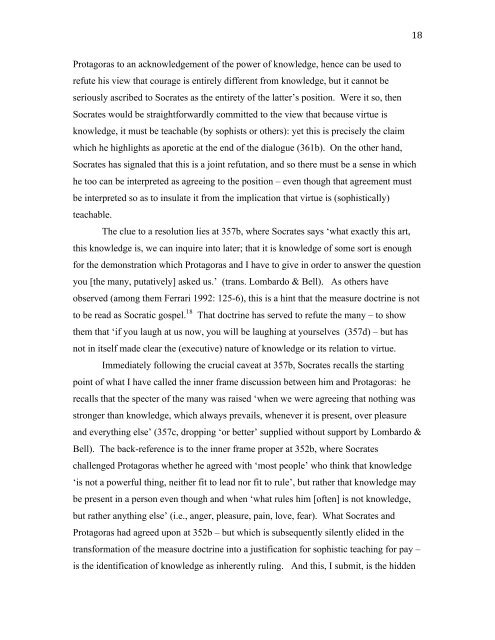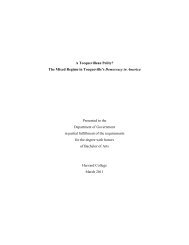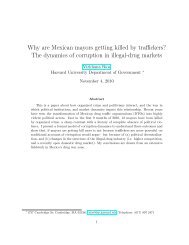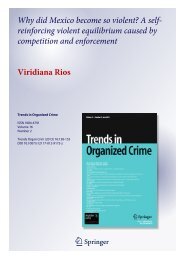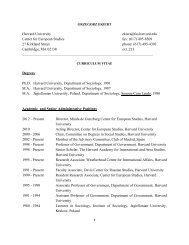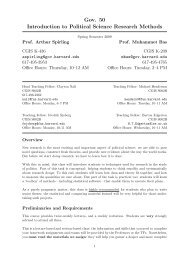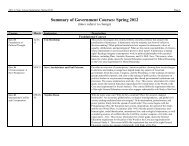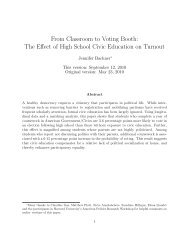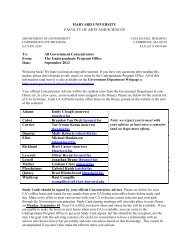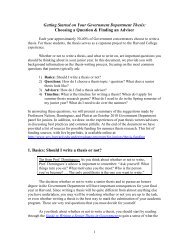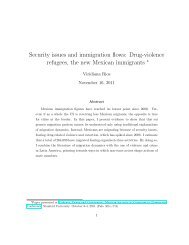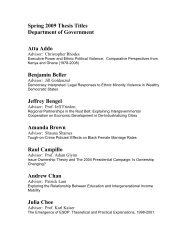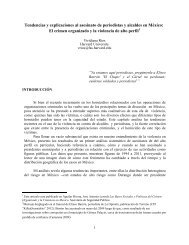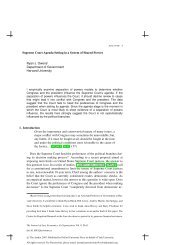1 Harvard University Political Theory Colloquium For 11 March 2010 ...
1 Harvard University Political Theory Colloquium For 11 March 2010 ...
1 Harvard University Political Theory Colloquium For 11 March 2010 ...
Create successful ePaper yourself
Turn your PDF publications into a flip-book with our unique Google optimized e-Paper software.
18 <br />
Protagoras to an acknowledgement of the power of knowledge, hence can be used to<br />
refute his view that courage is entirely different from knowledge, but it cannot be<br />
seriously ascribed to Socrates as the entirety of the latter’s position. Were it so, then<br />
Socrates would be straightforwardly committed to the view that because virtue is<br />
knowledge, it must be teachable (by sophists or others): yet this is precisely the claim<br />
which he highlights as aporetic at the end of the dialogue (361b). On the other hand,<br />
Socrates has signaled that this is a joint refutation, and so there must be a sense in which<br />
he too can be interpreted as agreeing to the position – even though that agreement must<br />
be interpreted so as to insulate it from the implication that virtue is (sophistically)<br />
teachable.<br />
The clue to a resolution lies at 357b, where Socrates says ‘what exactly this art,<br />
this knowledge is, we can inquire into later; that it is knowledge of some sort is enough<br />
for the demonstration which Protagoras and I have to give in order to answer the question<br />
you [the many, putatively] asked us.’ (trans. Lombardo & Bell). As others have<br />
observed (among them Ferrari 1992: 125-6), this is a hint that the measure doctrine is not<br />
to be read as Socratic gospel. 18 That doctrine has served to refute the many – to show<br />
them that ‘if you laugh at us now, you will be laughing at yourselves (357d) – but has<br />
not in itself made clear the (executive) nature of knowledge or its relation to virtue.<br />
Immediately following the crucial caveat at 357b, Socrates recalls the starting<br />
point of what I have called the inner frame discussion between him and Protagoras: he<br />
recalls that the specter of the many was raised ‘when we were agreeing that nothing was<br />
stronger than knowledge, which always prevails, whenever it is present, over pleasure<br />
and everything else’ (357c, dropping ‘or better’ supplied without support by Lombardo &<br />
Bell). The back-reference is to the inner frame proper at 352b, where Socrates<br />
challenged Protagoras whether he agreed with ‘most people’ who think that knowledge<br />
‘is not a powerful thing, neither fit to lead nor fit to rule’, but rather that knowledge may<br />
be present in a person even though and when ‘what rules him [often] is not knowledge,<br />
but rather anything else’ (i.e., anger, pleasure, pain, love, fear). What Socrates and<br />
Protagoras had agreed upon at 352b – but which is subsequently silently elided in the<br />
transformation of the measure doctrine into a justification for sophistic teaching for pay –<br />
is the identification of knowledge as inherently ruling. And this, I submit, is the hidden


